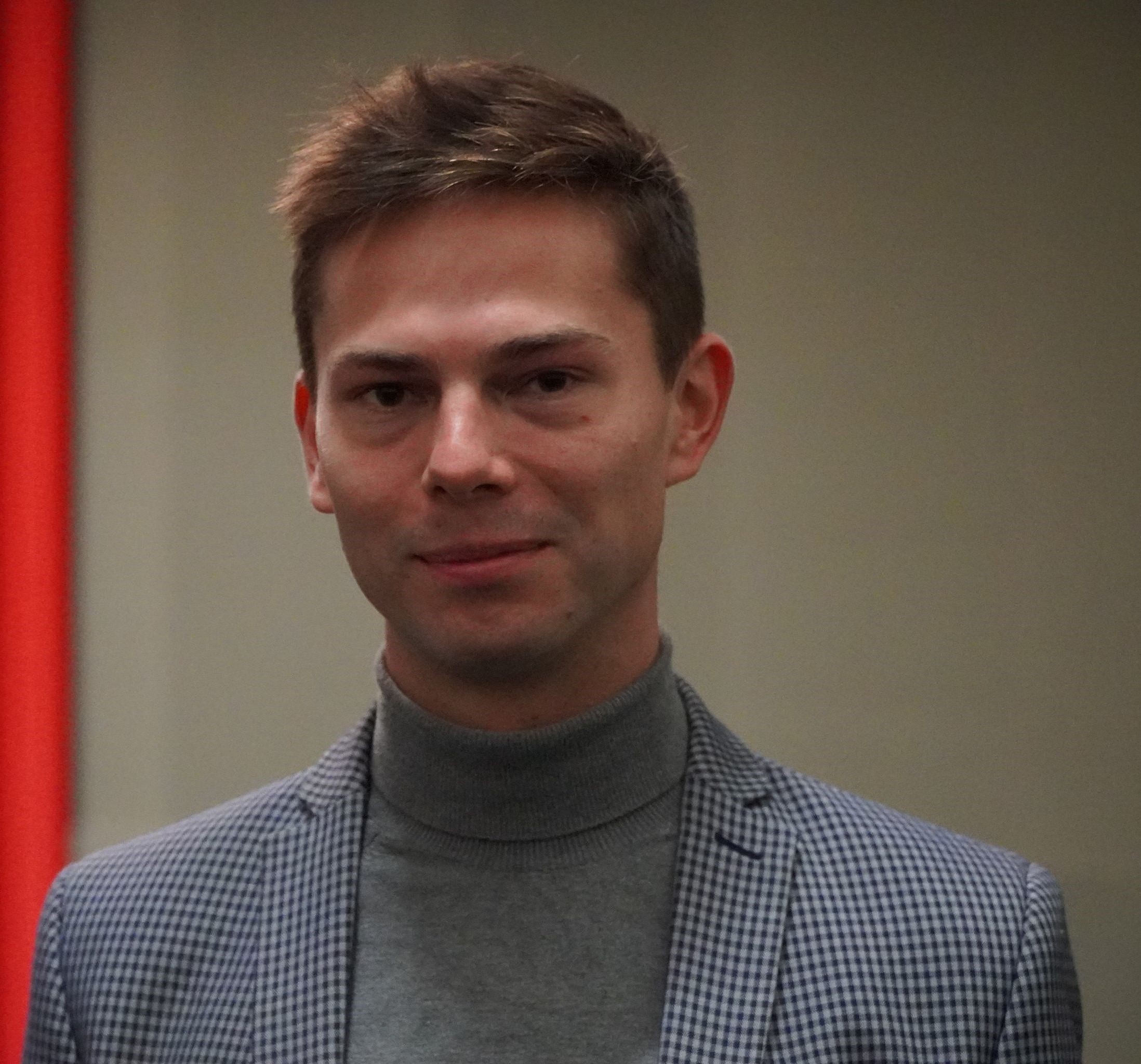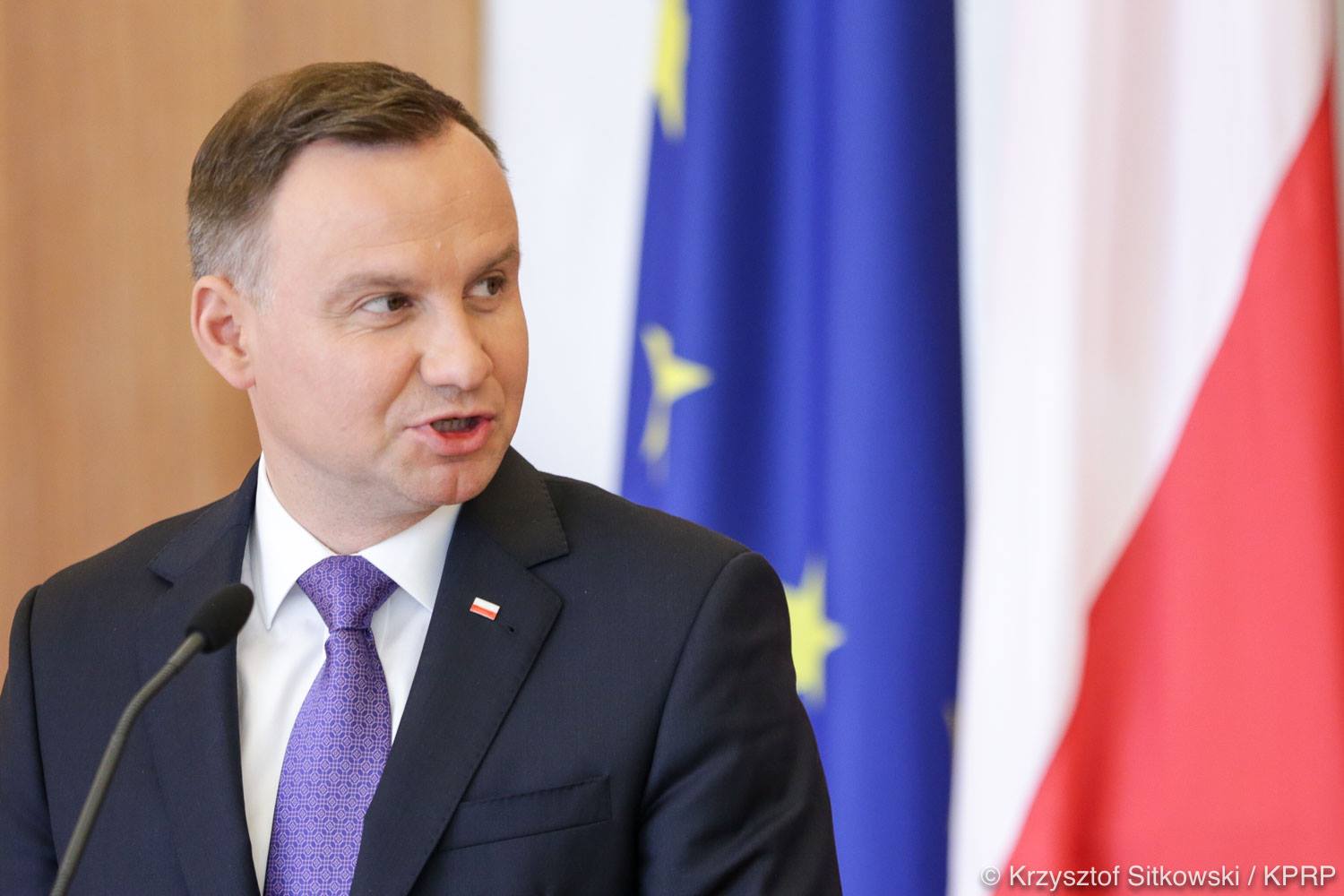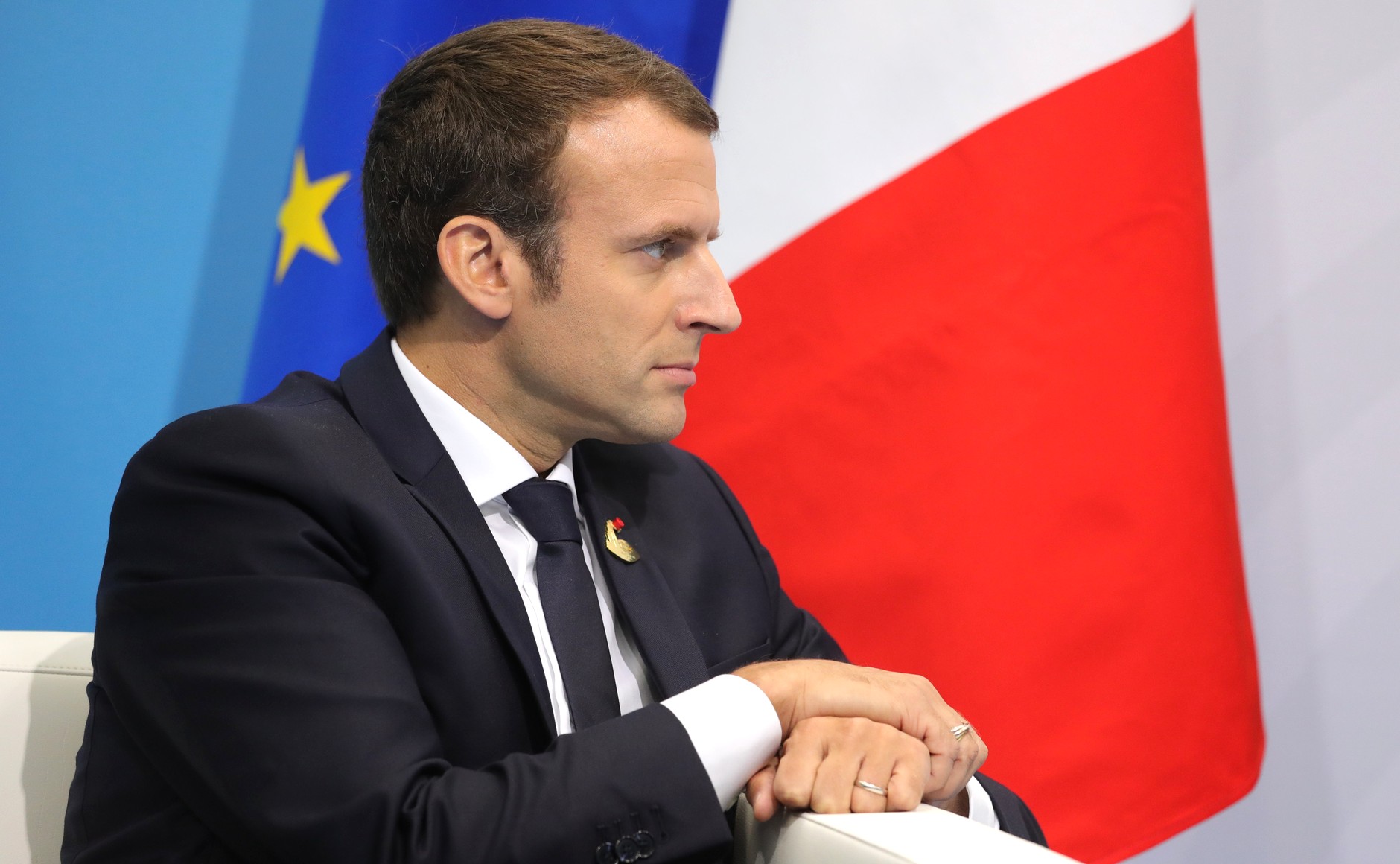By Sébastien Meuwissen, Belgo-Polish student in journalism at IHECS.
Poland – In a month, on Sunday, November 11, 2018, Poland will celebrate 100 years of recovery of her independence.
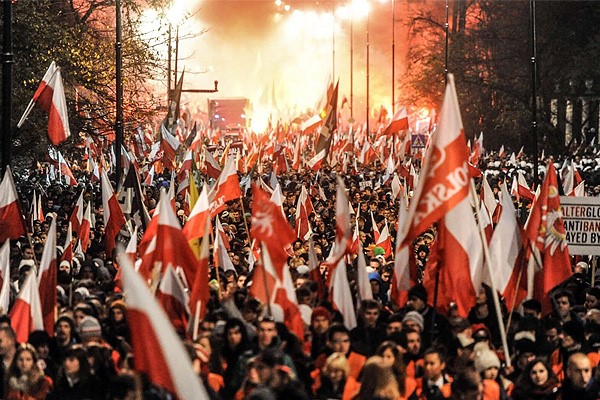
November 11 is a day of celebration and commemoration in Poland. For several weeks now, the white and red flags have floated proudly to celebrate freedom, so dear to the Polish people and for which they have long been deprived. In 1795, the once powerful Poland has completely disappeared from the map of Europe for the benefit of its neighbors. From 1795 to 1918, the Russian Empire, Prussia and Austria shared the entire Polish territory.
During this long period of 123 years, the country is the subject of a major campaign of depolonization. In addition to the occupation of the territory, the Russian and German invaders also conducted a policy to annihilate the “polonity”. The mere use of Polish in the occupied territories was severely punished in this context of Germanization (in the West) and Russification (in the East). This partly explains the attachment of Poles to their identity (national, cultural, religious, …). It was not until the signing of the Armistice of 11 November 1918 that Poland reappeared on the world map.
It must be kept in mind that Poland remains one of the oldest countries in Europe. The foundation of the Polish state dates from the year 966. During the seventeenth century, Poland represented one of the largest European powers with a territory extending over an area (largely) greater than that of the present France (Polish–Lithuanian Commonwealth, 815,000 km²).
A war of words that went too far
Every year, an “Independence March” is organized on November 11 in the capital, Warsaw. This grand parade is organized by several patriotic-conservative movements to celebrate the anniversary of this “revival” of the homeland.
The people present are also very diverse. Entire families coming from the provinces are also present. Mothers with their strollers parade alongside groups of young people, themselves surrounded by older people.
The 2017 edition of the Independence March took place in a respectful and serene atmosphere, without major incident. The many smoke bombs gave the streets of the city center a football stadium ambiance. Of a total number of citizens between 60,000 (police’s estimate) and 125,000 (estimate of organizers), a handful of extremists (between 50 and 100) have unfortunately made themselves known by brandishing racist or hateful banners. One of them reads: “Europe will be white or uninhabited. “
A large part of the foreign press (CNN, BBC, The Washington Post, the New York Times, Der Spiegel, El Pais, Le Monde, Libération, Russia Today, Al Jazeera …) quickly took the opportunity to launch a real campaign of denigration of this popular gathering, of the government which tolerates it (1) and, by extension, of the country which hosts it.
These media painted tens of thousands of people with the same brush than these activists, not worrying in this case about the amalgam, that they are so prone to denounce after each terrorist attack. In this case, no nuance: all the participants were treated of extremists.
“Fascists” “xenophobes” “anti-Semites”, “Islamophobes”, “racists”, “homophobes”, … One would have thought to attend the contest of the most insulting term to designate this human wave of Poles parading peacefully to celebrate the recovered freedom of their homeland and show their love for it.
The first prize in this defamation exercise undoubtedly goes to former Belgian Prime Minister Guy Verhofstadt. The President of the ALDE group in the European Parliament then declared in the same Parliament that “60,000 Fascists walked on Saturday in Warsaw, neo-Nazis, white supremacists (…) about 300 kilometers from Auschwitz-Birkenau”.
It is hard to believe that such absurd remarks could have been made by an experienced politician. They nevertheless reveal two interesting observations. On the one hand, this statement shows Mr Verhofstadt’s profound ignorance of Poland’s history as well as its past and present geopolitical situation. On the other hand, it confirms the tendency towards the complex of superiority (moral, ideological, cultural, …) of many members of the “western” elite (of which Verhofstadt is one of the front runners) vis-à-vis what is pejoratively called the “Eastern Countries”. This attitude makes it virtually impossible to discuss coherently the points of disagreement between “old Europe” and the CEECs (Central and Eastern European Countries) that joined the EU later.
A necessary clarification
If Mr Verhofstadt had even a minimum of good faith and / or basic knowledge of history, he would know that the Poles constitute the first European nation to have resisted Adolf Hitler’s National Socialist regime. as early as 1939 and consequently paid a heavy price. He would also know that the Germans looted and razed Warsaw in 1944 and that tens of thousands of civilians were killed by Wehrmacht soldiers throughout the Second World War.
To speak of “Polish neo-Nazis” is therefore at least intellectually dishonest and insulting, especially regarding the families of the victims who died under fascism that Verhostadt claims to denounce.
The height of the perfidy of these remarks can be illustrated by the presence at this Independence March of veterans of the Second World War who themselves fought the real Nazis! A surrealism worthy of George Orwell’s “1984” universe.
In addition to Polish President Andrzej Duda who said he was scandalized by such remarks, other personalities could not remain silent. A Polish NGO has filed a complaint against Guy Verhofstadt for defamation. “We do not agree with such accusations (…)”, said in a statement Mira Wszelaka, the president of the “Polish League against defamation”. “I took part in the march with a group of sympathizers of the League, I am neither fascist nor neo-Nazi”.
In the same vein, the Polish writer of Nigerian origin Bawer Aondo-Aka has also decided to sue the Flemish politician for defamation. “I will never accept being treated this way,” he said when he appeared on a Polish television show. “The few racists there were a drop of water in the ocean. It’s been four years since I participated in this parade. I am a Polish patriot and conservative, which is why it is my duty to prevent the proliferation of such lies against my country.”
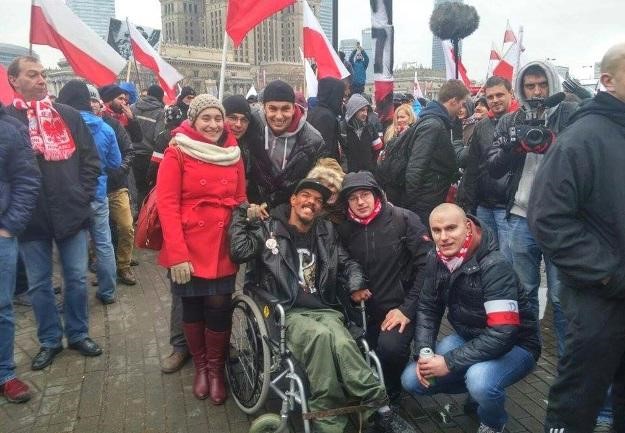
2018, a special edition
This year’s Independence March could be the biggest ever. The organizers are expecting a record number of participants that could exceed a hundred thousand.
Members of identitarian movements from other European countries (notably Hungarian and Slovak) should also be present on November 11th. The Independence March in Warsaw is a major event in the celebration of Polish-Hungarian friendship. This age-old friendship, which continues to be reinforced by the current socio-political context (2), illustrates the growing influence of V4 (Poland, Czechia, Slovakia, Hungary) on the international scene.
Although the vast majority of participants have no particular political affiliation the parade will have an important symbolic significance. In addition to celebrating the 100th anniversary of the recovery of Poland’s Independence, participants to the Independence March have several clear political messages to convey to Guy Verhofstadt, Frans Timmermans, Angela Merkel, Emmanuel Macon, Judith Sargentini as well as the other lesson-givers and admirers of the rich and harmful financial speculator George Soros.
Representing a different vision of Europe
Equipped with their flags, their smoke and their white and red scarves, the participants of the big parade embody ideas shared by the public opinion of the countries of Central Europe:
- to George Soros’ globalism and the extra-European, massive and often illegal mass immigration that results from it, the Independence March participants respond with the expression of their desire for national sovereignty and (re)control of their borders.
- facing the reign of political correctness and political cant that sterilizes the debates of society, they invoke freedom of expression for a direct and frank speech.
- instead of the imposed guilt, they proclaim loudly and proudly their pride of belonging to the Polish nation and, by extension, to European civilization
- considering the undergoing normalization of homosexuality, LGBT propaganda and pseudo-scientific gender theories, they are defending the traditional family model and Christian values
- witnessing the Islamization of many cities on the continent that leads to a fracture of Western societies, they invoke the principle of “my house, my rules”(3).
- and finally, in the face of Islamist terror that continues to rage, they place themselves as representatives of one of the safest regions in Europe.
It is to be hoped that the foreign media will have enough curiosity to go beyond their preconceptions and present a more nuanced aspect of the events of November 11 in Warsaw.
Translated from French by the Visegrád Post.
(1) Polish President Andzrej Duda stressed that he and his government strongly denounce any form of hate speech or incitement to hatred.
(2) The governments of Hungary and Poland are both threatened by the EU with their right to vote withdrawn through the activation of Article 7 of the Treaty on European Union.
(3) This principle has proved effective in Poland in that, unlike in many Western European cities, Polish metropolises are quite devoid of “no go zones” and the minorities living in Poland are perfectly integrated (Ukrainian, Belorussian) even assimilated (Kashubian).


